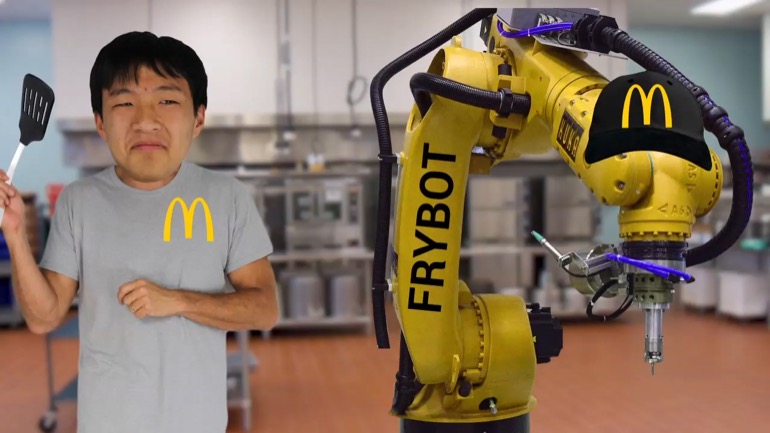ShmoopTube
Where Monty Python meets your 10th grade teacher.
Search Thousands of Shmoop Videos
Econ Videos 79 videos
What is a Production Possibilities Curve? The Production Possibilities Frontier Curve (PPF) is a statistical graphic curve that depicts the compari...
What are Income and Substitution Effects? Income effects reflects the increases or decreases in total consumption of goods and services in proporti...
How Do Companies Add Value? Companies add value by improving the client or customer experience. This can be achieved by offering better quality ser...
Econ: What is Aggregate Demand v. Aggregate Supply? 13 Views
Share It!
Description:
What is Aggregate Demand v. Aggregate Supply? Aggregate Demand refers to the total amount of demand for goods and services in a particular economy at a particular price over a specified time frame. Aggregate Supply refers to total supply in the same economy at the same price and time frame. The statistical relationship between the two is usually viewed in graphic form, especially since aggregate supply usually lags behind aggregate demand. Shifting of the chart in the ability to correlate the two is contingent on how soon supply catches up with demand, which can take days, weeks or months.
Transcript
- 00:00
And finance Allah Shmoop What is aggregate demand versus aggregate
- 00:06
supply We're assuming you all know about supply and demand
- 00:12
Really Nothing The fundamental concepts of economics Anyone crickets were
- 00:17
not mad We're just disappointed in you But we'll go
- 00:20
over It quickly supplies the amount of something There is
Full Transcript
- 00:23
like I'll imagine a warehouse one filled with Roquefort cheese
- 00:27
Row after row of shelves filled with you know pungently
- 00:31
stinky Roque for cheese that people want to eat voluntarily
- 00:34
so that supplies fly cheese All right Now demand out
- 00:37
there mostly in France and in small pockets throughout the
- 00:40
rest of the cheese eating world There are people who
- 00:42
love Roque for cheese They just want to stick its
- 00:46
moldy tang right into their mouths And actually like tasting
- 00:49
That's the demand People want the cheese right now to
- 00:52
aggregate supply and aggregate demand Well aggregate here just means
- 00:57
total Like in everything in all the world all the
- 01:00
demand added up and that equals aggregate demand All right
- 01:04
and all the supply added up and all that stuff
- 01:06
you have that equals aggregates supply Well these two terms
- 01:09
come up when you talk about an economy as a
- 01:11
whole Aggregate demand is that man for all goods and
- 01:14
services available in an economy All the cheese yes but
- 01:18
also all the haircuts the overrides the sushi dinners the
- 01:21
massages and fancy colorful drinks with little umbrellas in them
- 01:24
at all that up in a whole lot more That's
- 01:26
aggregate demand and also all the cars and appliances and
- 01:30
pianos and air conditioners and electricity and gasoline and furniture
- 01:32
And Kato diet shakes those everything Meanwhile you have aggregate
- 01:36
supply Well that's a total supply of all these goods
- 01:38
and services that an economy supplies all the output of
- 01:41
the makers or providers of haircuts and sushi dinners and
- 01:45
massages and fancy drinks as well as all the other
- 01:47
stuff that gets made in an economy will aggregate demand
- 01:50
can be affected by a few items and it's a
- 01:52
huge number so tiny little one percent d kind of
- 01:55
effects are still huge numbers All right so what affects
- 01:58
it Well one is the value of money so changes
- 02:01
in inflation expectations can either encourage people to buy more
- 02:05
stuff or encourage them to sock away money for the
- 02:08
future If people think inflation is going to be high
- 02:10
in the future well people may run out today and
- 02:13
buy stuff before prices go up This would increase aggregate
- 02:17
demand right If they're confident they're currency will hold its
- 02:21
value in the future People will be more likely to
- 02:23
save or invest their money well This a lower aggregate
- 02:27
demand as people put off purchases until later Will interest
- 02:30
rates play a role as well Here low interest rates
- 02:33
make borrowing and thus buying easier Low interest rates Allow
- 02:37
people to buy more big ticket stuff you know like
- 02:40
cars or houses or yachts On the other side of
- 02:43
the world there are some things that traditionally impact aggregates
- 02:46
Supply supply shocks can temporarily impact aggregates supply like of
- 02:50
a hurricane wipes out a major oil refinery or coal
- 02:53
area Or if a herd of elephants runs rampant in
- 02:56
the country's strategic peanut reserve Or there's a zombie apocalypse
- 03:00
leading workers to exit the region So the cost of
- 03:04
labor then goes up right because when your toilets overflowing
- 03:07
you don't care what your pain for that plumbing Or
- 03:09
there's a rare goat disease that cuts into cheese production
- 03:14
you know or at least adds to production costs So
- 03:16
now all of a sudden there's less supply of cheap
- 03:19
goat cheese There's only the expensive greenhouse grown goat cheese
- 03:23
and still the same amount of demand So supplies your
- 03:25
last and then and then costs go up right It's
- 03:27
also productivity gains from technology can impact aggregate demand That's
- 03:32
another factor here of force As the economy gets better
- 03:34
it producing things it can make more stuff from the
- 03:38
same supply or same amount of resource is so of
- 03:41
robots could suddenly make muffins for five cents each instead
- 03:45
of the twelve cents each it cost When humans make
- 03:47
him well then aggregate demand for muffins would probably go
- 03:51
up because they suddenly got a whole lot cheaper Thank
- 03:54
you Mr Robot Danger Danger What does that mean from
- 03:57
an investment side Well if companies invest less because of
- 04:01
negative expectations higher taxes or higher borrowing costs well then
- 04:06
everything shifts to the left meaning it cools down There's
- 04:10
less volume being traded around less supply less demand because
- 04:14
the higher borrowing costs have added friction to the process
- 04:17
And usually governments do that when they're afraid of high
- 04:20
inflation spiraling out of control and they raise the central
- 04:23
bank rates around the world or the Fed in the
- 04:26
U S so remember again the very small changes and
- 04:28
things like borrowing costs just a half a percent or
- 04:31
something on fifty trillion dollars Sloshing around out there have
- 04:34
enormous effects on the marginal supply and marginal demand volumes
- 04:39
that you know get put through the system You know
- 04:41
I think about a drainpipe in a heavy rainstorm that's
- 04:43
totally full of rain and suddenly that big pipe contracts
- 04:46
happen inch in diameter Well bad things happen to the
- 04:50
other end So back to our mad goat disease Well
- 04:53
if robots find a way to mold cheese more efficiently
- 04:56
and make it cheaper by the pound while there's going
- 04:58
to be more rope for to go around and then
- 05:00
think about all of this applied to globally lower interest
- 05:04
rates like even the difference of one percent globally in
- 05:07
a desa trillion dollar economy one percent All that borrowing
- 05:11
is a massive number So if they lower interest rates
- 05:13
you'll be able to borrow more money to be able
- 05:15
to buy all the high end stinky cheese when you
- 05:17
could get your hands on So yeah I think about
- 05:19
aggregate demand aggregate supply their huge numbers across the whole
- 05:23
global economy So very small things still affect a ton 00:05:27.77 --> [endTime] of people a lot Yeah
Related Videos
GED Social Studies 1.1 Civics and Government
What is bankruptcy? Deadbeats who can't pay their bills declare bankruptcy. Either they borrowed too much money, or the business fell apart. They t...
What's a dividend? At will, the board of directors can pay a dividend on common stock. Usually, that payout is some percentage less than 100 of ear...
How are risk and reward related? Take more risk, expect more reward. A lottery ticket might be worth a billion dollars, but if the odds are one in...



















































































